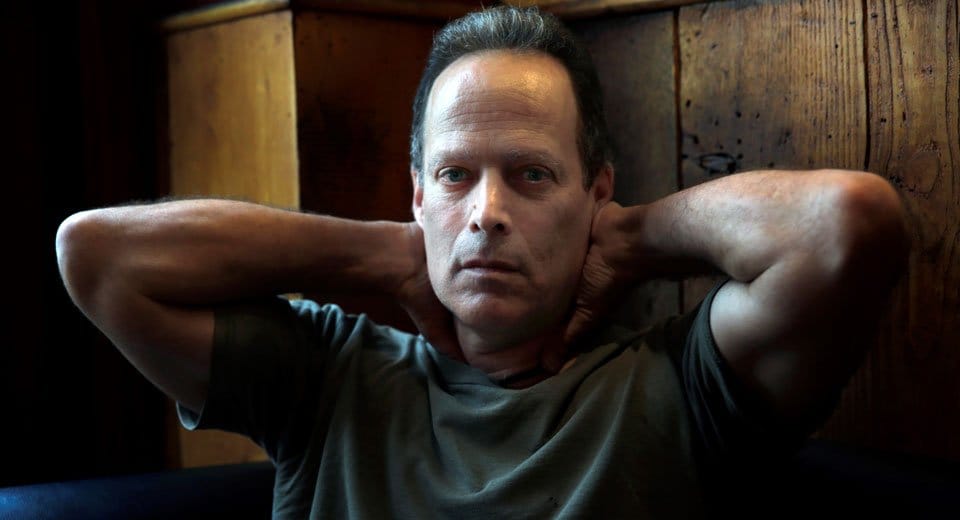Sebastian Junger: ‘It’s a Miracle’

Best-selling author and war correspondent Sebastian Junger is known for writing about dangerous jobs and spending time on the front lines during combat. He was once ambushed by a rebel group in Sierra Leone and had a bullet hit within a few inches of his head, smashing into a sandbag next to him, in Afghanistan.
But in the safe environment of Cape Cod, Junger never imagined he would be in close proximity to death—without warning.
In the early evening of June 16, 2020, the 58-year-old was relaxing on his couch in his Truro home with his wife and two young children, when suddenly, a sharp pain shot up through his abdomen. He then adjusted his posture, thinking he was just sitting in an awkward position. When Junger tried to stand up, he nearly fell over. “I said to my wife, ‘Something is really wrong. I have never felt like this,’” said Junger, during a recent interview at Cape Cod Hospital. Junger added he had no preceding symptoms and he has been healthy and athletic his entire life.
Within a few minutes, he couldn’t walk. “So she half dragged me to the driveway, put me in the passenger seat of the car and called 911.”
When the EMTs arrived at their home, located at the end of a dirt road in a remote part of Truro, Junger said his vision started to blur. He asked himself, “Am I having a stroke? I couldn’t figure it out. What could this be?” Junger was bleeding internally during the hour-long ambulance ride. When he arrived at Cape Cod Hospital, his blood pressure was extremely low at 60/40.
An emergency medicine physician working in the Emergency Room that evening, quickly recognized that Junger had a vascular catastrophe and began his resuscitation and diagnostic workup. Emergency medicine physician Craig Cornwall, MD helped out with logistics and activated a Code Crimson, a term for a massive blood transfusion. Spencer Wilson, MD inserted a line in his jugular vein for the procedure, in which Junger required 10 units of blood.
“While he was doing that, I really went off the cliff,” said Junger. “A black pit opened up underneath me and I felt myself being pulled into the pit.
“Then my dead father appeared above me. I didn’t know I was dying, but I knew something very bad was happening. It was like I was on the edge of a cliff. I didn’t want to go into the pit. It seemed kind of too easy to do.”
The emergency room team then rushed him into the Interventional Radiology (IR) suite for a CAT Scan and it was determined that Junger had an undiagnosed aneurysm in his pancreatic artery that ruptured without warning—an often fatal event. After he was stabilized, he was treated by vascular surgeon Daniel Gorin, MD and interventional radiologist Philip Dombrowski, MD. He spent five days in the Intensive Care Unit, plus another two days recovering at Cape Cod Hospital.
“I owe my life to everyone who worked on me that day,” says Junger. “Grateful isn’t a strong enough word. The idea that my little girls could have lost their dad is the most traumatizing part of this whole thing. (Junger has two daughters ages 2 and 5.)
“My experience at Cape Cod Hospital was so incredibly good. I have so much affection for the place. My life almost ended at age 58 in a really tragic way. There were people willing to stay up late, until three in the morning, and do anything they possibly could to save me.”
Junger also credits blood donors for saving his life. He never thought about giving blood before, but now he donates as much as he can. “I now say to people, if you want to feel like you’re a part of something, part of this nation, there are three things you can do: You need to vote, you need to serve on jury duty and you need to give blood.”
Although Junger was raised an atheist and doesn’t believe in God, he says his close encounter with death is the equivalent of a religious experience.
“It made me understand the existential amazement. Here we are—what a blessing. What a treasure. If you could live with that somewhere in your mind, this amazement that you are alive, you are leading a meaningful life.”
Junger, who divides his time between New York and Truro, plans to write a book about his near-death experience. The working title is “Pulse: What Keeps Us Alive and What Happens When We Die.” In the book, he will explore life after death from a scientific point of view and talk to the doctors and providers at Cape Cod Hospital who gave him exceptional care.
“I am going to be grateful to this place and the people who saved me for the rest of my life. I think about that day a lot. I think about those people who helped me and how wonderful they were to me. They worked really hard to save someone they didn’t know. What’s more noble than that?”
